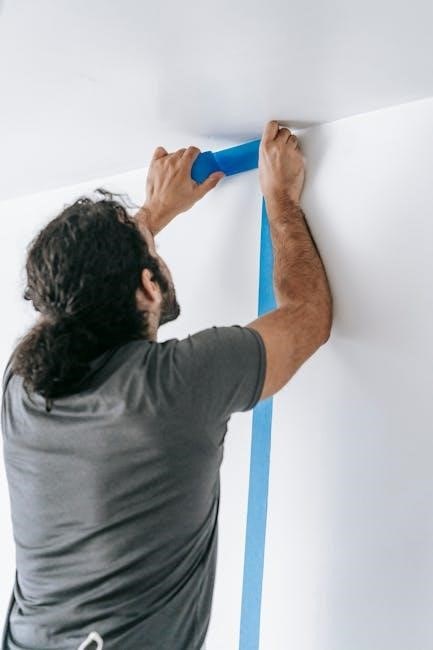Smithing is a cornerstone skill in EverQuest, empowering players to craft essential weapons, armor, and tools. It drives character progression and enhances in-game economy through resourceful crafting.
Why Smithing is Essential in EverQuest
Smithing is vital for crafting weapons, armor, and tools, enhancing character progression and self-sufficiency. It allows players to create gear tailored to their needs, reducing reliance on vendors. High-quality equipment crafted through smithing boosts combat effectiveness and survivability. Additionally, it drives the in-game economy, enabling players to earn platinum by selling crafted items. Mastery of smithing is a cornerstone for both personal advancement and contributing to group success, making it an indispensable skill in EverQuest.
Overview of Smithing Skills and Progression
Smithing progression in EverQuest begins with basic crafting and advances through skill levels, unlocking recipes for better gear. Starting with fundamental tools like forges and anvils, players gather resources to craft simple items. As skill increases, more complex recipes become available, such as fine plate and banded armor. The journey culminates at the 300 skill cap, where mastery allows crafting elite equipment. Each step requires patience, practice, and strategic resource management to achieve expertise.

Gathering Resources for Smithing
Gathering ores, metals, and rare materials is vital for smithing. Players must locate essential resources like iron, steel, and cobalt ore in specific zones. Forges and anvils, found in cities like Freeport and Qeynos, are crucial for crafting. Rare materials like acrylia can enhance high-end items, making resource collection a cornerstone of smithing success.
Types of Ores and Their Uses
In EverQuest, ores are the foundation of smithing. Iron ore is versatile for basic weapons and armor, while steel ore is used for more durable items. Cobalt ore is essential for high-level armors like plate and banded sets, offering superior strength. Acrylia, found in later expansions, is used for advanced armor types such as Shadowscream gear. Each ore type serves specific crafting purposes, making understanding their uses crucial for effective smithing.
Where to Find Rare and Essential Materials
Rare ores like cobalt are found in high-level zones such as Nagafen’s Lair, while acrylia is abundant in The Ruins of Sebilis. Essential materials like steel and iron ores are commonly mined in Mountains of Rathe and other mineral-rich zones. Rare molds and patterns often drop from specific enemies or are found in treasure chests. Some materials, like acrylia, are exclusive to later expansions, requiring exploration of newer zones or trading with other players to acquire.

Crafting Essentials: Tools and Equipment
Essential tools include forges, anvils, and molds. Forges are crucial for heating ores, while anvils shape metals. Molds and patterns dictate crafting outcomes, enabling precise item creation.
The Role of the Forge and Anvil
The forge and anvil are indispensable tools in EverQuest smithing. The forge heats ores to their melting points, enabling metal purification and shaping. Anvils serve as workstations for crafting weapons and armor, allowing precise hammering and molding of heated metals. Both tools are essential for creating high-quality items and progressing through the smithing skill tree. Forges can be found in major cities like Freeport and Qeynos, making them accessible for crafting.
Importance of Molds and Patterns
Molds and patterns are crucial for crafting specific items in EverQuest smithing, ensuring precise shapes and designs. They determine the final form of weapons, armor, and tools. Acquiring the right molds is essential, as they dictate the type of item you can create. File molds, for instance, are among the easiest to find, while others may require more effort. Combining materials like metal bits, files, and flasks with molds allows for successful crafting, making them indispensable for advancing your smithing skills.

Basic Smithing: Crafting Your First Items
Begin by crafting simple tools and weapons, such as crude weapons and basic armor, using readily available materials. A forge and anvil are essential tools for starting your smithing journey, and they can be found in most major cities like Freeport or Qeynos, making it easier to begin crafting fundamental items.
Step-by-Step Guide to Crafting Basic Weapons and Armor
- Gather iron or copper ores and basic materials like metal bits and molds.
- Use a forge and anvil to combine materials into crude weapons or armor.
- Start with simple items like a crude sword or chainmail tunic.
- Experiment with different combinations to improve quality and triviality.
- Sell surplus items to gain platinum and fund further crafting.
Understanding Triviality and Skill Ups
Triviality determines when crafting an item no longer grants skill increases. Each item has a trivial level based on its difficulty. Once your skill exceeds this level, crafting it becomes trivial and stops providing skill-ups. To continue progressing, craft higher-level items or use rare materials. Skill-ups occur randomly during crafting, with better materials increasing the chance. After reaching triviality, focus on complex recipes or high-end materials like cobalt to maximize skill gains and reach the 300 cap efficiently.
Advanced Smithing: High-End Crafting
Mastering high-end materials like cobalt and fine plate unlocks powerful gear. Crafting intricate items demands precision, rare resources, and advanced techniques, yielding exceptional equipment for seasoned adventurers.
Crafting Fine Plate and Banded Armor
Fine plate and banded armor are high-end crafting staples in EverQuest, offering exceptional protection. To craft fine plate, gather rare ores like acrylia or shadowscream, while banded armor requires steel and molds. Both demand high skill levels and precise recipes. Acrylia armor is cheaper than sickles but requires patience. Use specific molds and patterns to ensure success. Experimenting with these materials can yield powerful gear, making them highly sought after by players for their durability and performance in combat.
Mastering Cobalt and High-Level Materials
Cobalt and high-level materials are crucial for crafting elite gear in EverQuest. Cobalt ore is essential for creating trophy armor once you’ve reached the 300 skill cap. Acrylia and shadowscream are premium materials used in advanced armor sets, offering superior protection. Working with these requires precision and high-quality molds. Experimenting with these rare ores can yield exceptional results, making your crafted items highly sought after by top-tier players seeking powerful equipment for challenging content.

Skill Progression and Optimization
Mastering smithing requires consistent practice and strategic planning. Focus on breaking items to gain skill points efficiently, ensuring steady progression toward higher levels and mastery.
Tips for Efficient Skill Increases
- Focus on breaking items to gain skill points, as this method is highly effective for steady progression.
- Experiment with different ores and materials to discover optimal combinations for skill increases.
- Utilize low-triviality recipes to maximize skill gains, especially during early stages.
- Avoid crafting high-triviality items until necessary, as they offer minimal skill improvements.
- Regularly review and adjust your crafting strategies to ensure efficiency and progression.
By following these tips, you can optimize your skill growth and achieve mastery in smithing.
Reaching 300 Skill Cap and Beyond
Reaching the 300 skill cap in smithing unlocks advanced crafting opportunities and mastery of high-end materials. To achieve this, focus on crafting high-triviality items like cobalt armor templates, which are essential for skill progression. Experiment with rare ores and materials to refine your techniques. Once at 300, consider specializing in niche items or mastering expansion-specific content for continued growth. This milestone signifies true mastery of smithing, enabling you to craft premium gear and contribute to the in-game economy effectively.
- Use cobalt ore for high-level crafting.
- Experiment with rare materials for optimal results.
- Stay updated with game expansions for new opportunities.
Economy of Smithing: Making Platinum
Smithing offers lucrative opportunities to earn platinum by crafting high-demand items like armor and weapons. Focus on identifying profitable recipes and mastering pricing strategies to maximize income.
- Craft in-demand gear for consistent sales.
- Optimize prices based on market trends.
Identifying High-Demand Items
In EverQuest, crafting high-demand items like Fine Plate, Banded armor, and weapons ensures consistent sales. Players often seek upgrading gear, making mid-tier equipment profitable. Focus on crafting weapons, tools, and armor that align with current trends. Rare materials like cobalt ore can produce high-value items. Additionally, crafting molds and repair tools are always in demand. Selling these items at the bazaar or to other players can yield significant platinum, making smithing a lucrative trade.
- Fine Plate armor
- Banded armor sets
- Weapons like rapiers and sickles
- Lantern molds and arrowheads
Pricing Strategies for Maximum Profit
To maximize profit in EverQuest smithing, analyze market demand and set competitive prices. Research the bazaar to identify gaps and price items slightly lower than competitors. Focus on high-demand items like Fine Plate and Banded armor, ensuring prices reflect crafting costs and time. Bulk crafting reduces per-item expenses, increasing margins. Adjust pricing dynamically based on server economy and player activity. Timing sales during peak hours can also boost profitability.
- Research bazaar prices
- Set competitive rates
- Consider crafting costs
- Adjust for server economy
Additional Tips and Tricks
Avoid common mistakes like overstocking materials and neglecting shortcut recipes. Stay organized, experiment with new patterns, and maintain a clean workspace for efficiency. Time-saving techniques matter.
- Use shortcut recipes
- Experiment with new patterns
- Organize materials effectively
Avoiding Common Mistakes in Smithing
Avoid overstocking materials, as it can lead to waste. Neglecting shortcut recipes is a pitfall—use them to save time. Don’t skip experimenting with new patterns, as they enhance skill growth. Poor organization of your workspace and resources can hinder efficiency. Over-reliance on high-end materials early on can stall progress. Lastly, never underestimate the importance of maintaining a clean and well-organized inventory to streamline your crafting process and avoid costly errors.
- Avoid overstocking materials
- Use shortcut recipes for efficiency
- Experiment with new patterns
- Maintain a clean workspace
Shortcut Recipes and Time-Saving Techniques
Mastering shortcut recipes can significantly boost efficiency in smithing. Use pre-crafted materials like metal bits and file molds to speed up production. Prioritize crafting items with high demand, such as arrowheads, to maximize resource use. Organize your inventory to quickly access needed components. Additionally, familiarize yourself with forge locations to minimize travel time. Utilizing these techniques ensures smoother progression and reduces wasted materials.
- Use pre-crafted materials for faster production
- Focus on high-demand items like arrowheads
- Organize inventory for quick access
- Leverage forge locations to save time

